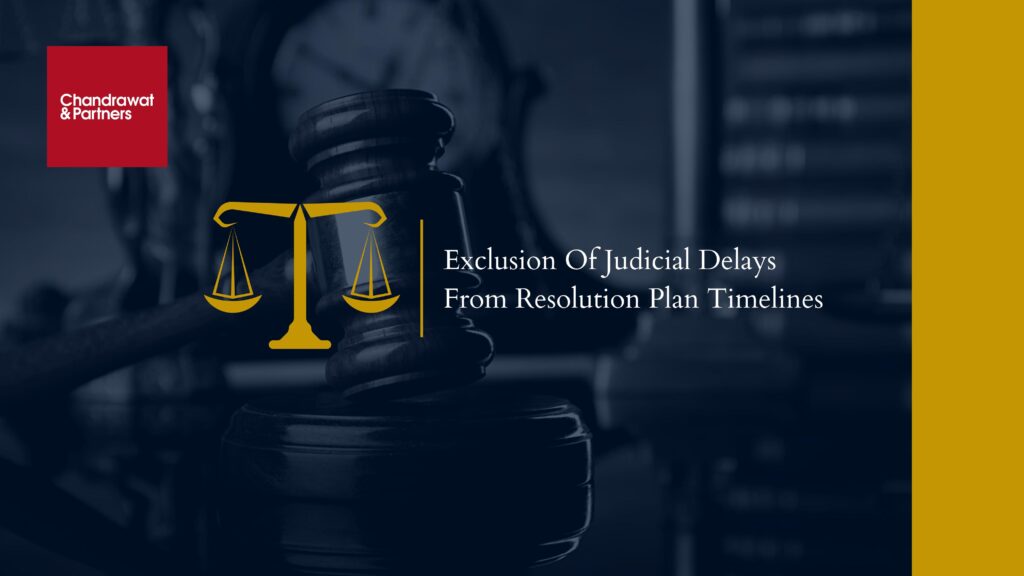Home > Recent Judgements > Exclusion Of Judicial Delays From Resolution Plan Timelines
August 07, 2024

BACKGROUND
In the case of Majestic Auto Ltd. versus Sharan Hospitality Pvt. Ltd. and Anr. , the National Company Law Appellate Tribunal (the “NCLAT”) relied on the ground for liquidation of a Corporate Debtor to establish that the stay granted by a higher Court can stall the implementation of the resolution plan. In the present case, the Respondent was admitted into insolvency on 08.05.2019. The Resolution Plan of the Appellant was approved by the Committee of Creditors (the “CoC”) on 30.01.2020 and by the Adjudicating Authority on 15.04.2021.
Thereafter, an order was passed by the Hon’ble Delhi High Court (the “court”), when appellant approached the court in connection with a decree held against the promoters of the Respondent, restraining the Respondent from transferring or creating third-party interests in its immovable properties. The Appellant could only implement the resolution plan and take over the Respondent’s assets once the court’s injunction orders were modified or vacated.
The court stated that such restraint would not apply to the implementation of the resolution plan as approved by the Adjudicating Authority on 15.04.2021. The decision was challenged before the Hon’ble Supreme Court. The Hon’ble Supreme Court on 13.12.2021 granted the ad-interim stay.
The Appellant seeked exclusion of time period from 13.12.2021 being the date on which interim stay was granted by the Hon’ble Apex Court until the date of filing of the Interlocutory Application (I.A.) from the 18 months’ time frame provided for commencement of the implementation of the resolution plan. On the other hand, Respondent No. 2 approached the Adjudicating Authority seeking liquidation of the Corporate Debtor stating grounds of non-implementation of the resolution plan. The Adjudicating Authority approved liquidation of the Corporate Debtor. Thereafter, Appeal has been filed in NCLAT by the Appellant.
ISSUES
- Whether the Appellant can seek exclusion of time from 13.12.2021 till the date of filing the I.A. from the time period of eighteen months provided in the resolution plan and for an extension of time for implementation of the resolution plan?
OBSERVATION OF THE COURT
- Resolution Plan Dependency:
The CoC and the Adjudicating Authority approved the resolution plan of the Appellant, fully aware that the plan’s implementation depended on the modification or vacation of stay orders issued by the Delhi High Court. This was clearly articulated in the ‘Basic Assumptions’ clauses of the resolution plan, which state that the plan will lapse if the stay orders are not vacated or modified by the Delhi High Court or any higher court. Additionally, Clause 4(e) of the ‘Basic Assumptions’ provides that if any Appeal is filed against the stay orders, the implementation period shall be put on hold.
- Impact of Stay Orders:
The Adjudicating Authority acknowledged that the implementation of the resolution plan was contingent on the vacation or modification of the stay orders. The Respondent had been restrained from transferring its assets under these stay orders, which were issued in connection with the Daiichi Sankyo Co. Ltd. proceedings.
- Supreme Court’s Interim Orders:
The Appellant’s inability to implement the resolution plan was solely due to the interim orders issued by the Supreme Court, which maintained the status quo regarding the stay orders from the Delhi High Court. The Supreme Court’s interim orders resulted in a complete embargo, stalling the resolution process.
- Adjudicating Authority’s Misstep:
The Adjudicating Authority believed that the delay in the resolution process, caused by ongoing litigation, justified passing a liquidation order. It reasoned that since the implementation of the plan was contingent upon the outcome of the litigation and the stay orders, Respondent No. 2’s interests were being jeopardized. Therefore, it was concluded that liquidation was a viable option under these circumstances.
DECISION
The NCLAT set aside the Adjudicating Authority’s order for the liquidation of the Respondent Company. The tribunal acknowledged that the implementation of the resolution plan was delayed due to interim orders by the Supreme Court, which were beyond the Appellant’s control. It is also a settled law that when a higher court grants a stay that stalls the implementation of the resolution plan, the said period can be excluded from the time period given for implementation of the resolution plan. It directed the Adjudicating Authority to allow the exclusion of time from 13.12.2021 until the Supreme Court’s stay orders are resolved. The NCLAT emphasized that the Supreme Court’s decisions must be respected and that the Appellant cannot be penalized for delays caused by these proceedings. Additionally, the tribunal clarified that discussions under Clause 8 ‘Basic Assumption’ of the resolution plan should focus on implementation, not liquidation. The NCLAT concluded that none of the conditions under Section 33 of the Insolvency and Bankruptcy Code, 2016 for liquidation were met, hence the Financial Creditor could not force liquidation through the Adjudicating Authority.
For more information or queries, please email us at
enquiries@chandrawatpartners.com



